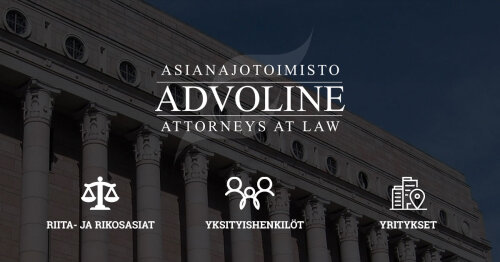Best Antitrust Lawyers in Finland
Share your needs with us, get contacted by law firms.
Free. Takes 2 min.
Or refine your search by selecting a city:
List of the best lawyers in Finland
About Antitrust Law in Finland
Antitrust law in Finland aims to ensure fair competition and prevent practices that might harm competition in the market. Governed primarily by the Competition Act, Finnish antitrust laws align closely with European Union regulations, particularly those outlined in the Treaty on the Functioning of the European Union (TFEU). The Finnish Competition and Consumer Authority (FCCA) is responsible for enforcing these laws, ensuring that businesses operate fairly and consumers benefit from competitive practices.
Why You May Need a Lawyer
There are several situations where seeking legal help in the field of antitrust might be necessary. Examples include:
- Facing investigations or allegations of anti-competitive practices, such as price-fixing or market dominance abuse.
- Navigating mergers and acquisitions that require approval from competition authorities.
- Understanding compliance requirements to avoid engaging in prohibited practices.
- Responding to complaints or accusations from competitors or other market participants.
- Seeking to address unfair competition by other businesses in your industry.
Local Laws Overview
Finnish antitrust law is mainly encapsulated within the Competition Act, which aims to prohibit restraints on competition and abuse of dominant market positions. The key aspects of local laws include:
- Prohibition of Anticompetitive Agreements: Agreements between businesses that restrict competition, such as price-fixing or market sharing, are prohibited.
- Abuse of Dominant Position: Firms with a dominant position in the market are prohibited from abusing this position, for example, through unfair pricing or limiting production.
- Merger Control: Certain mergers and acquisitions require notification to the FCCA to assess their impact on competition within Finland.
- Cartel Prohibition and Leniency Policy: Severe penalties are imposed on companies involved in cartels, but leniency is offered for parties that come forward and cooperate with the authorities.
Frequently Asked Questions
What is the role of the FCCA in enforcing antitrust laws?
The Finnish Competition and Consumer Authority (FCCA) is tasked with monitoring and enforcing compliance with competition laws in Finland. They investigate antitrust violations and assess mergers for potential impacts on market competition.
What types of agreements are considered anti-competitive in Finland?
Anti-competitive agreements can include price-fixing, market or customer sharing, limiting production, or bid-rigging, all of which are prohibited under Finnish competition law.
What constitutes abuse of a dominant market position?
Abuse could take several forms, including unfair pricing, limiting production to raise prices, or creating barriers to entry to exclude competitors.
How are mergers assessed under Finnish competition law?
Mergers are assessed based on their potential impact on market competition. Transactions meeting certain thresholds must be notified to the FCCA for review and approval.
What penalties can be imposed for violating antitrust laws in Finland?
Penalties can include substantial fines, orders to cease illegal practices, and, in severe cases, annulment of offending agreements or transactions.
Is there a process to report suspected antitrust violations?
Yes, individuals and companies can report suspected violations directly to the FCCA, which can then conduct investigations and take appropriate enforcement actions.
Can businesses appeal decisions made by the FCCA?
Yes, businesses can appeal decisions made by the FCCA to the Market Court, and further to the Supreme Administrative Court, if necessary.
What is the leniency policy regarding cartels?
The leniency policy encourages businesses involved in cartels to come forward and cooperate with authorities by offering reduced penalties in exchange for information about the cartel.
How long does it typically take for the FCCA to review a merger notification?
The initial phase of merger review can take up to one month, with more complex cases requiring a second phase, extending the review period to several months.
Who can I contact if I need advice on antitrust compliance?
It is advisable to contact a lawyer specializing in competition law. Legal experts provide guidance on compliance, risk assessments, and defend against investigations or allegations.
Additional Resources
For further assistance, the following resources may be useful:
- Finnish Competition and Consumer Authority (FCCA): The main governmental body responsible for enforcing competition law and providing guidance.
- The Market Court: The judicial body that handles appeals against FCCA decisions.
- The European Commission: For issues that also fall under EU competition law.
- Legal Firms Specializing in Competition Law: These firms can offer specialized advice and representation.
Next Steps
If you require legal assistance in matters related to antitrust in Finland, consider the following steps:
- Assess Your Situation: Determine whether you need legal advice for compliance, responding to allegations, or other antitrust-related matters.
- Consult a Specialist Lawyer: Seek a legal expert with experience in Finnish and EU competition law to guide you through the process.
- Prepare Documentation: Gather any necessary documentation related to your case or inquiry to facilitate a comprehensive legal consultation.
- Engage with Authorities if Necessary: Be prepared to communicate or cooperate with the FCCA if required during investigations or compliance checks.
- Stay Informed: Continuously update your understanding of existing and new antitrust laws and regulations to ensure ongoing compliance.
Lawzana helps you find the best lawyers and law firms in Finland through a curated and pre-screened list of qualified legal professionals. Our platform offers rankings and detailed profiles of attorneys and law firms, allowing you to compare based on practice areas, including Antitrust, experience, and client feedback.
Each profile includes a description of the firm's areas of practice, client reviews, team members and partners, year of establishment, spoken languages, office locations, contact information, social media presence, and any published articles or resources. Most firms on our platform speak English and are experienced in both local and international legal matters.
Get a quote from top-rated law firms in Finland — quickly, securely, and without unnecessary hassle.
Disclaimer:
The information provided on this page is for general informational purposes only and does not constitute legal advice. While we strive to ensure the accuracy and relevance of the content, legal information may change over time, and interpretations of the law can vary. You should always consult with a qualified legal professional for advice specific to your situation.
We disclaim all liability for actions taken or not taken based on the content of this page. If you believe any information is incorrect or outdated, please contact us, and we will review and update it where appropriate.
Browse antitrust law firms by city in Finland
Refine your search by selecting a city.

















